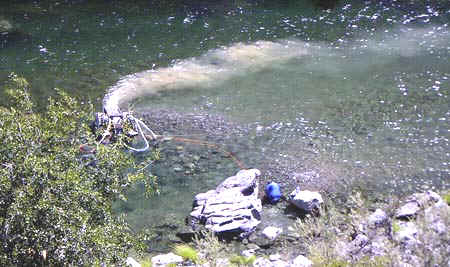CSPA |
| Your 501(c)(3) tax deductible cash donations are desperately needed if the fight for our fisheries is to continue. Read how you can donate! |

 More News
More News
![]()
California fish and game denies petition to protect fisheries from recreational mining
Tribes, Fishermen, and Conservationists Dismayed by Agency’s failure to act
January 26, 2009 -- Sacramento, CA – Last month, the Karuk Tribe, California Trout, and Friends of the North Fork formally petitioned California Fish and Game to restrict the controversial gold mining technique known as suction dredge mining. The groups’ call to limit the recreational mining technique comes as California faces the worst fisheries collapse in history.
The petition was supported by the Tsi-Akim Maidu Tribe, the Sierra Fund, PCFFA, and a host of conservation organizations.
However, today the agency decided to not act on the petition, allowing the fish killing hobby to continue unabated.
“I guess DFG really stands for Department of Frontier Greed,” said Leaf Hillman, Vice Chair of the Karuk Tribe and opponent of suction dredge mining.
...(Continued)
Fish and Game Director Don Koch had a month to consider the petition which was far from an all out ban on dredging and was instead a call for modest restrictions in river segments serving as critical habitat from some of California’s most threatened fish species including ESA listed coho salmon, and at risk species such as green sturgeon and pacific lamprey.
The Department is currently under a court order to re-write its mining permit rules statewide as a result of a Karuk Tribe lawsuit in 2006. However the rule making process has not yet begun allegedly due to budget constraints.
“The fact that DFG’s mining program has to be subsidized by taxpayers adds insult to injury,” said Glen Spain of the Pacific Coast Federation of Fishermens’ Associations. “In the midst of both a fiscal and fisheries crisis DFG is subsidizing the destruction of our fishing economy with tax payer dollars – it’s shameful.”
The groups’ petition asked Department of Fish and Game Director Don Koch to use his authority to implement immediate emergency restrictions on where and when suction dredging can take place – the same authority used to restrict recreational and commercial fishing when fish runs are low.
 |
| A suction dredge in action on the Klamath. Photo courtesy of Craig Tucker, Spokesperson Karuk Tribe |
Suction dredges are powered by gas or diesel engines that are mounted on floating pontoons in the river. Attached to the engine is a powerful vacuum hose which the dredger uses to suction up the gravel and sand (sediment) from the bottom of the river. The material passes through a sluice box where heavier gold particles can settle into a series of riffles. The rest of the gravel is simply dumped back into the river. Often this reintroduces mercury left over from historic mining operations to the water column threatening communities downstream. Depending on size, location and density of these machines they can turn a clear running mountain stream into a murky watercourse unfit for swimming.
According to petitioners, DFG spends $1.25 million per year to subsidize the destruction of California fisheries by gold mining hobbyists. Many of these hobby miners are from out of state as California’s mining laws are less restrictive than those of neighboring states.
In California, fishermen buy 2.4 million fishing licenses each year. The sportfishing industry supports a total of 43,000 jobs amounting to $1.3 billion in wages and salaries annually. Fishing equipment sales total over $2.4 billion per year. By comparison, DFG only issues 3,000 permits for suction dredging each year.
For the Karuk Tribe the threat is even greater. “Harvesting and consuming salmon is a fundamental part of Karuk culture. These recreational miners are threatening more than the survival of a fish, they threaten the survival of one of California’s oldest cultures,” said Hillman.
The Karuk Tribe and there are still pushing for a CEQA review of the Department’s mining regulations to happen as soon as possible, but that could take several more years. In the meantime fish advocates are considering other strategies to win immediate restrictions.
“While lawmakers are cutting state programs to the bone – including school lunch programs for poor kids and elder care – they should take the opportunity to save over a million dollars by simply banning suction dredge mining state wide or else force miners to pay their fair share,” concluded Hillman.
For more information:
Craig Tucker, Spokesperson Karuk Tribe cell 916-207-8294
Glen Spain, PCFFA, 541-689-2000
Izzy Martin, Sierra Fund, 530 265-8454 x11